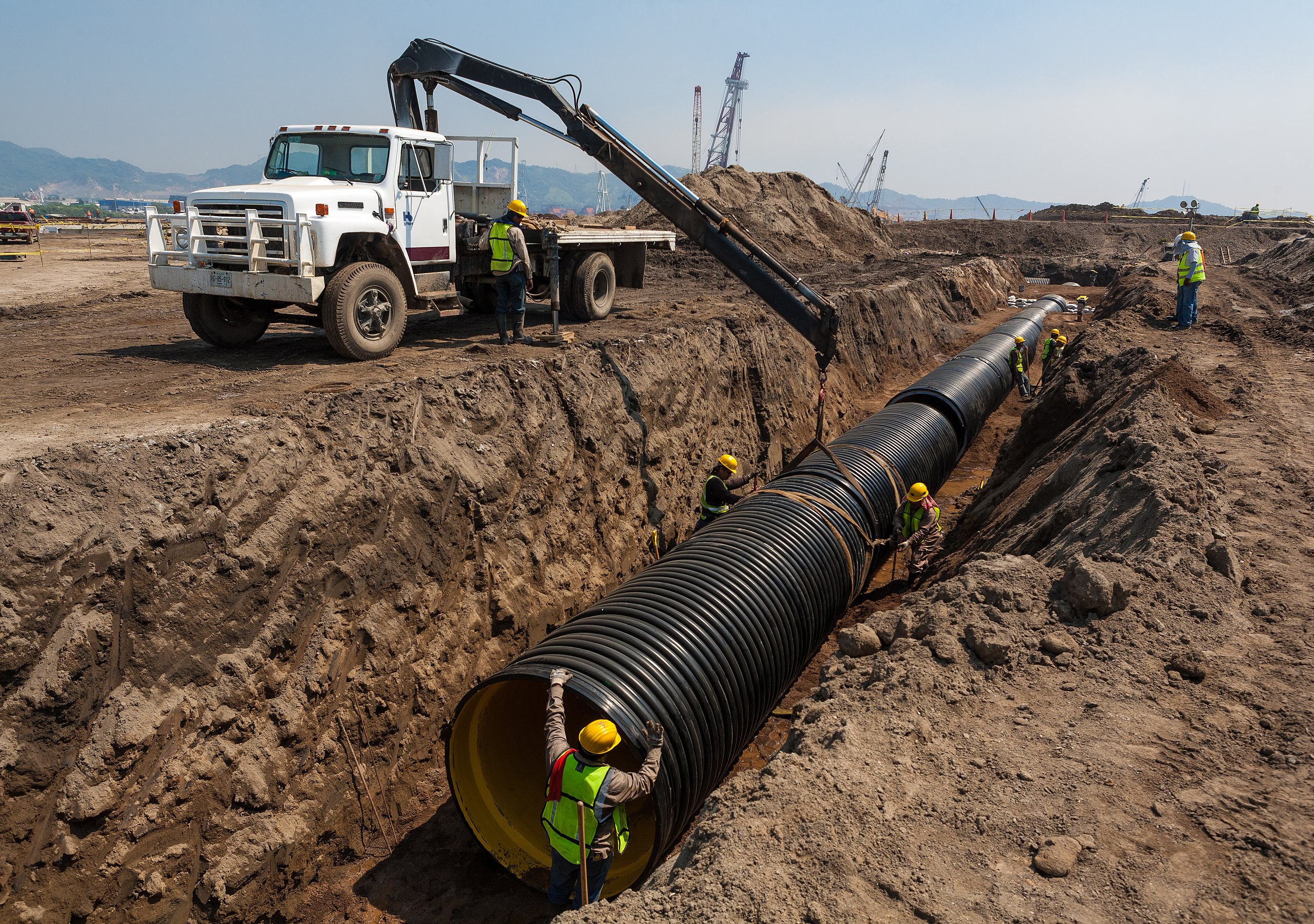Comprehending the Key Benefits of HDPE Pipe for Water and Wastewater Management
The usage of HDPE pipeline in water and wastewater management offers countless benefits that merit consideration. Its outstanding longevity and lengthy life expectancy make it a preferred selection for numerous tasks. Additionally, the material's resistance to deterioration and chemical damages boosts its reliability in different atmospheres. However, the benefits expand past simply durability and resistance. Discovering its cost-effectiveness and environmental influence reveals much more compelling factors for its prevalent fostering in modern-day framework
Remarkable Resilience and Durability

HDPE pipeline attracts attention for its exceptional toughness and longevity, making it a preferred option in water management systems. Created from high-density polyethylene, these pipes can endure considerable stress and anxiety, making certain trusted efficiency with time. Their robust nature allows them to endure severe ecological conditions, consisting of temperature variations and dirt activities, which can create various other materials to fall short.
The life expectancy of HDPE pipelines commonly goes beyond half a century, giving a cost-effective remedy for municipalities and markets alike. In addition, the product's light-weight homes streamline installation, reducing labor costs and durations. This sturdiness lessens the demand for constant repair services or replacements, even more boosting its financial charm.
In water administration applications, the dependability of HDPE pipelines indicates fewer disturbances and boosted solution continuity, making them important to lasting facilities advancement. The combination of toughness and durability strengthens HDPE's duty as a cornerstone in reliable water management remedies.

Resistance to Deterioration and Chemical Damage
While several products yield to rust and chemical damage with time, HDPE pipes display exceptional resistance, making them perfect for different water management applications. This resilience comes from the molecular structure of high-density polyethylene, which is naturally non-reactive and does not wear away like steels or weaken from direct exposure to rough chemicals. Because of this, HDPE is very efficient in atmospheres with aggressive substances, such as wastewater systems that might have acids, bases, and natural solvents.
Furthermore, HDPE pipes can endure environmental factors such as dirt level of acidity and saline conditions, further enhancing their suitability for varied applications (American Plastics HDPE Pipe Manufacturing). Their capability to maintain architectural stability over time lowers the danger of leaks and failings, which is important in making certain the security and reliability of water circulation and wastewater management systems. The resistance to deterioration and chemical damage markedly contributes to the total efficiency and longevity of HDPE piping options.
Cost-Effectiveness and Financial Benefits
When taking into consideration the financial implications of water management systems, the cost-effectiveness of HDPE pipelines becomes noticeable. These pipes use lower installment and maintenance expenses contrasted to conventional products like metal or concrete. Their lightweight nature streamlines transport and installation, leading to decreased labor expenditures. Additionally, HDPE pipes show a lengthy lifespan, usually exceeding half a century, which converts to less replacements and long-lasting financial savings.
Additionally, the resistance of HDPE to rust and chemical damages decreases the need for costly repairs and replacements. The pipes also support effective water flow, minimizing power costs associated with pumping systems. By mitigating leaks and water loss, HDPE pipes contribute to significant financial advantages for communities and markets alike. Generally, the preliminary investment in HDPE piping can yield substantial economic returns over the life expectancy of the water monitoring system, making it a sensible selection for sustainable facilities advancement.
Ecological Sustainability and Reduced Impact

Convenience and Flexibility in Installation
As a result of their unique buildings, HDPE pipes supply impressive convenience and versatility in installation, making them suitable for a wide array of applications. Their lightweight nature allows for easier handling and transport, minimizing labor costs and installment time. HDPE pipes can be curved and formed to fit different surfaces and project requirements, which is specifically beneficial in testing environments.
Additionally, their resistance to corrosion and chemical damage enables for installation in diverse setups without the requirement for specialized protective finishings. The ability to fuse joints produces a continuous, leak-free system, boosting the total honesty and dependability of the setup. HDPE's adaptability likewise fits ground motion, reducing the risk of damage in locations susceptible to changing soil. On the whole, these attributes make HDPE pipelines not only functional but likewise a preferred option for water and wastewater management systems.
Often Asked Concerns
Exactly How Does HDPE Pipe Contrast to PVC in Water Administration Applications?
HDPE pipe supplies remarkable flexibility, resistance to rust, and durability contrasted to PVC. Its lighter weight facilitates easier installment, while its long life expectancy reduces replacement expenses, making HDPE a recommended selection in water monitoring applications.
What Is the Life-span of HDPE Pipes Under Typical Conditions?
Under common conditions, HDPE pipelines can have a lifespan ranging from 50 to 100 years. Their toughness and resistance to corrosion add to their lasting performance in various applications, making them a trustworthy choice for framework.
Are HDPE Piping Recyclable After Their Life Span?
Yes, HDPE pipelines are recyclable after their life span. Pipe Supplier American Plastics Midland. They can be refined and repurposed right into new products, substantially lowering ecological effect and promoting sustainability within the sector, making them a green selection for piping remedies
What Is the Installation Refine for HDPE Pipeline?
The setup process for HDPE pipelines includes website preparation, trenching, pipeline combination or mechanical joining, backfilling, and pressure screening. Proper methods assure a long lasting and effective system for transferring water and wastewater effectively.
Can HDPE Piping Be Used for Both Drinkable and Non-Potable Water Equipments?
Yes, HDPE pipelines can be made use of for both drinkable and non-potable water systems. Their convenience, sturdiness, and resistance to deterioration make them appropriate for different applications, making certain secure and effective transport of water in various contexts.